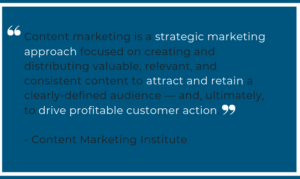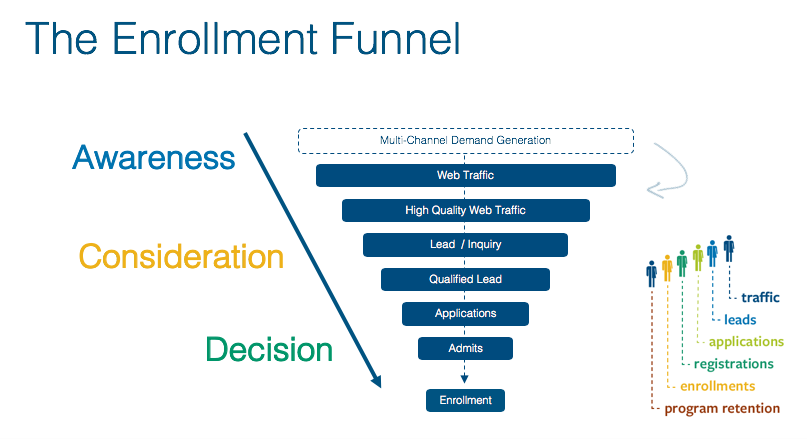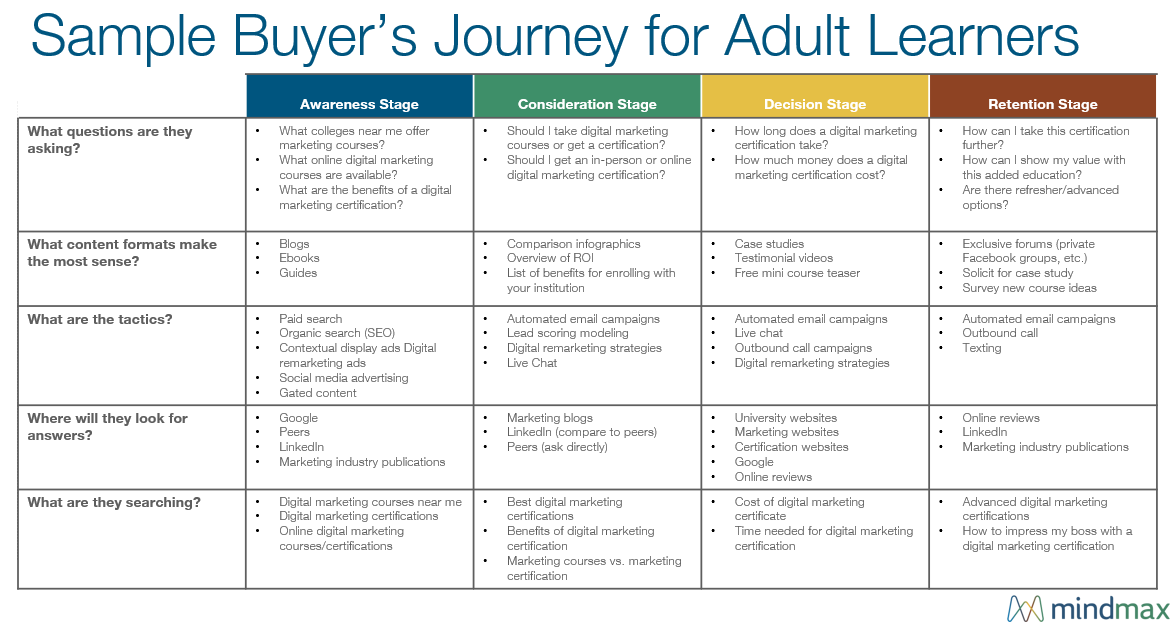Marketing to Adult Learners via the Buyer’s Journey
Marketing to Adult Learners via the Buyer’s Journey
Give prospective students what they want based on what they’re looking for
A great content marketing strategy is key to inbound leads but without great content at its core, you won’t get very far. Aligning your content to the buyer’s journey is the next step in helping prospective students select your institution for their educational needs.
There are many definitions of good content, but we believe it needs to be both valuable and relevant to your prospective students.
 If content is relevant but not valuable, it will be perceived as watered down or undermining your prospects. If your content is valuable but not relevant, it will be ignored altogether. In either case, you risk coming across as a pestering brand rather than a helpful one.
If content is relevant but not valuable, it will be perceived as watered down or undermining your prospects. If your content is valuable but not relevant, it will be ignored altogether. In either case, you risk coming across as a pestering brand rather than a helpful one.
This begs the question: how do you know what content to provide to prospective students and when?
The answer is in the questions
Based on where prospective students are in the buyer’s journey, their needs and questions vary. For example, someone just defining a need to want to learn more about financial planning will have different questions than someone who has already researched–and short-listed–three nearby institutions that offer financial planning certifications.
Uncovering the questions
To find the questions, determine the problem your prospective students have which will vary based on programs and personas. Read more about developing personas.
Then for each stage, determine the following:
- What questions are they asking?
- What content formats make the most sense?
- What are the tactics?
- Where will they look for answers?
- What are they searching?
Here is an example of an adult learner who wants to increase knowledge in digital marketing but does not want to enter a master’s program.
Awareness Stage
In this stage, prospective students are just becoming aware that they have a problem needing to be solved. In the example above, prospective students want to learn more about digital marketing certificate.
To appeal to this group of prospective students, offer multiple pieces of content that answer their questions within this buyer stage. For example:
- A guide on how to select the right digital marketing course or certification
- Blogs explaining the various types of digital marketing and the need for staying relevant in this field and how courses/certification help solve that
Consideration Stage
In this stage, prospective students are considering all their options, including your institution. In the example above, prospective students are comparing the various options they’re finding through online searches and other means.
To appeal to this group of prospective students, offer multiple pieces of content that answer their questions within this buyer stage. For example:
- Comparison infographics
- Overview of ROI
- List of benefits for enrolling with your institution
Decision Stage
In this stage, prospective students are ready to decide and likely have your institution short-listed with one or more competitors. In the example above, prospective students are looking for persuasive content to help them choose.
To appeal to this group of prospective students, offer multiple pieces of content that answer their questions within this buyer stage. For example:
- Case studies
- Testimonial videos
- Free mini course teaser
The journey doesn’t end at the Decision Stage
We encourage schools to think in terms of LTV – lifetime value of a student. In the future, this increased LTV will be driven by how schools stay relevant and engaged in supporting adults as they navigate an everchanging job and career market that will require ongoing education.
This stage is all about getting your students to return to your institution.
Retention Stage – Lifetime Value (LTV) of a Student
In this stage, you’ve successfully enrolled students and now need to keep them engaged for future activities including additional schooling for themselves or others, and for referrals. In the example above, students are looking for content to help them use what they’ve learned, connect with others, and refresh or advance their education in the future.
To appeal to this group of prospective students, offer multiple pieces of content that answer their questions within this buyer stage. For example:
- Exclusive forums (private Facebook groups, etc.)
- Solicit for case study
- Survey new course ideas
Takeaway
By understanding the questions your prospective students ask, you’ll be able to develop helpful content for all stages of the buyer’s journey. This will ensure you’re providing relevant and valuable information at every step along the way, leading them to choose you over your competitors.
Download a a free Buyer’s Journey Template here.



